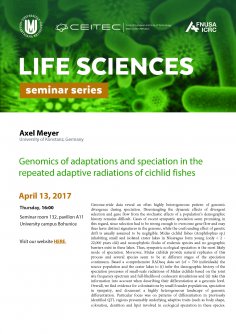Abstract
Genome-wide data reveal an often highly heterogeneous pattern of genomic divergence during speciation. Disentangling the dynamic effects of divergent selection and gene flow from the stochastic effects of a population’s demographic history remains difficult. Cases of recent sympatric speciation seem promising in this regard, since selection had to be strong enough to overcome gene flow and may thus leave distinct signatures in the genome, while the confounding effect of genetic drift is usually assumed to be negligible. Midas cichlid fishes (Amphilophus sp.) inhabiting small and isolated crater lakes in Nicaragua form young (only < 2 - 22,000 years old) and monophyletic flocks of endemic species and no geographic barriers exist in these lakes. Thus, sympatric ecological speciation is the most likely mode of speciation. Moreover, Midas cichlids provide natural replicates of this process and several species seem to be at different stages of the speciation continuum. Based a comprehensive RADseq data set (of > 700 individuals) the source population and the crater lakes to (i) infer the demographic history of the speciation processes of small-scale radiations of Midas cichlids based on the joint site frequency spectrum and full-likelihood coalescent simulations and (ii) take this information into account when describing their differentiation at a genomic level. Overall, we find evidence for colonizations by small founder populations, speciation in sympatry, and document a highly heterogeneous landscape of genomic differentiation. Particular focus was on patterns of differentiation in previously identified QTL regions presumably underlying adaptive traits (such as body shape, coloration, dentition and lips) involved in ecological speciation in these species.








